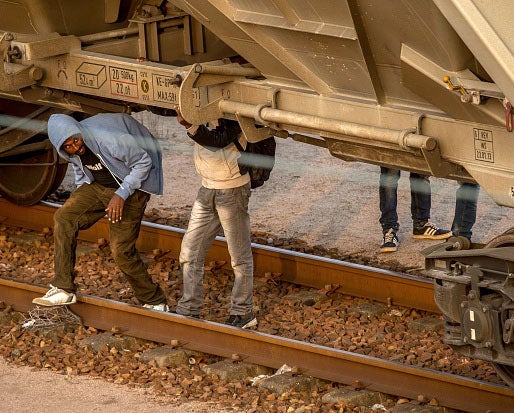Calais migrant crisis: Eurotunnel says break-in attempts down from 2,000 to 150
But the number of attempts to reach Britain is still 'unacceptable'

Your support helps us to tell the story
From reproductive rights to climate change to Big Tech, The Independent is on the ground when the story is developing. Whether it's investigating the financials of Elon Musk's pro-Trump PAC or producing our latest documentary, 'The A Word', which shines a light on the American women fighting for reproductive rights, we know how important it is to parse out the facts from the messaging.
At such a critical moment in US history, we need reporters on the ground. Your donation allows us to keep sending journalists to speak to both sides of the story.
The Independent is trusted by Americans across the entire political spectrum. And unlike many other quality news outlets, we choose not to lock Americans out of our reporting and analysis with paywalls. We believe quality journalism should be available to everyone, paid for by those who can afford it.
Your support makes all the difference.The number of migrants trying to break into the Eurotunnel terminal near Calais has fallen dramatically since the introduction of extra security measures, the operator has said.
At its peak near the end of July, some 2,000 desperate migrants were trying to access the tunnel to reach Britain in a single night.
Eurotunnel said the number had fallen to about 150 after the UK government paid for additional fencing, floodlighting, infra-red detectors and CCTV cameras.
But it said the number still remained “unacceptable”, and French police said the measures were only a “short-term solution” which did not solve the main issue of what to do with thousands of migrants living in desperate conditions in camps outside Calais.
“There has been a real fall in the number of attempted break-ins,” a Eurotunnel spokesman said.
David Cameron has been criticised for his choice of language when addressing the Calais migrant crisis, defending his description of the desperate would-be refugees as a “swarm” and accusing them of trying to “break in” to Britain.
But Eurotunnel said the introduction of extra security personnel had a direct impact on the disruption to freight services and passenger trains, and described the fall in access attempts a “huge improvement”.
Speaking to the BBC, Natalie Chapman from the Freight Transport Association said they had seen a “big reduction” in calls from lorry drivers affected by the Calais crisis.
She said: “We still have concerns about the welfare of drivers... but once they're in the secure compounds around Eurotunnel things seem to be a lot better.”
Later on Sunday the BBC was scheduled to broadcast an edition of Songs of Praise filmed inside a Calais migrant camp known as “the Jungle”, where a group of migrants has built a ramshackle church for Christian worshippers.
The broadcaster has faced criticism over its decision to film there, with a front-page story in the Express calling it a waste of licence fee-payers’ money. But Aaqil Ahmed, the BBC’s head of religion and ethics, said the show would focus on faith not politics.
What happens to migrants if they fail to make it to the UK remains a complicated issue, both "legally and diplomatically", Refugee Studies Centre director Alexander Betts told the BBC.
Most have already passed through one or more safe countries before getting to France - let alone to Britain - and so could in theory be sent back to their point of entry to the EU under the Dublin Regulation.
In practice, with a lack of documentation and often any record of where they landed, this is difficult, and The Local's French edition reports that many Calais migrants have simply become resigned to staying there.
"England would be good, but I'm tired," a 24-year-old Sudanese man called Sadam told The Local. He has decided to apply to stay in France instead.
Join our commenting forum
Join thought-provoking conversations, follow other Independent readers and see their replies
Comments